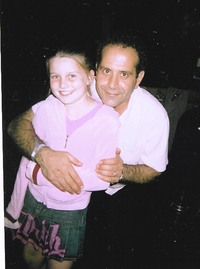I was looking for something on my hard-drive and came across this article I wrote for "Written By," the WGA Journal, back when I was an executive producer on DIAGNOSIS MURDER. At the time, I’d read a number of interviews with showrunners, boasting about how they worked days, nights, and weekends on their shows. So I wrote this piece and was inundated with letters from showrunners…and lowly staff writers…thanking me for it. I thought I’d share the article with you:
There’s a strange perception among writer/producers in TV that the quality of a person’s work increases when the quality of a person’s life suffers. Of course, no one says it that way, at least not in the interviews I’ve been reading with show-runners in Written By, TV Guide, Entertainment Weekly
and other publications the last few months. These writer/producers brag about how they work seven days a week, well into the night, to the detriment of family, health and sanity, purely to maintain the quality of their shows.
They believe the one thing that separates a true writer from a hack is a willingness
to sacrifice one’s marriage and health to the show. Quality demands absolute
dedication to the series, nothing else matters.
One writer/producer brags that when he’s in production, he has no life and that he regularly, and repeatedly, calls his writing staff over the weekend to go over story points, script notes, and other issues. Clearly, there is no escape from quality.
Another attributes his years of drug addiction to the pressure of turning out “high quality” scripts for A-list series. Now he’s no longer on drugs, is remarried, and is content working on mediocre shows… the implication being if he returned to doing an acclaimed show, he’d be jamming needles between his
toes in no time.
The show runner of a cult hit boasts that success hasn’t weakened his resolve to do his best work, that’s why he still eats breakfast, lunch and dinner at his office nearly seven days a week. Thank God. If he ate a meal with his family, his series might never recover.
I’m a show runner, and my series is in the top 20, but now I know why it’s not a cult hit. Why I don’t have an Emmy or a WGA award. Why I’m not widely acclaimed and much admired.
Because I try to get home in time for dinner with my wife and daughter. Because I try not to work on weekends. Because I try to put my family first and my show second.
Sure, I work late some nights, even some weekends, and so does my staff. But it’s the exception, not the rule. If it wasn’t, then I think that would make me a lousy show-runner.
I guess that means I’m doomed to mediocrity. I’ll never have to worry about forgetting someone in my Emmy acceptance speech.
Actually, I think what these show-runners are saying is ridiculous. It’s trendy, sexy and hip to say you’re suffering for your craft. It’s not trendy, sexy and hip to say you’re inept at balancing your personal and professional lives.
It’s sad, not admirable, that they are holding up their misery, and the misery they demand of others, as something to be proud of. The correlation they find between addiction, marital woes, and physical distress and “quality” is merely a rationalization for professional disorganization and personal weakness.
I’ve worked for show-runners like that, and I never will again.
These people not only work themselves to exhaustion, divorce, and cardiac arrest, but demand that everyone working for them do the same. Any staffer who puts their family before The Show (ie favors quality of his life over qualify of the work) is a coward, a slacker, a hack, and worst of all, not a team player. The truth is, these show-runners aren’t demanding enthusiasm, creativity, and devotion
from their staffs, what they are really looking for is co-dependence.
It is possible to have a hit show without sacrificing everything that’s important in life. It is possible to do “quality work” and still make it home for dinner. It is possible to win the acclaim of critics and the respect of your peers without having the numbers for a good divorce lawyer and an understanding drug counselor in your rolodex.
It just doesn’t look good. It doesn’t make you sound as tough, ballsy and dedicated. Writers, in fact, like the image. The problem is that too many of them are trying to live up to it.

